初中易混动词时态大集合(有详解)
八年级英语 动词时态知识点总结超详细
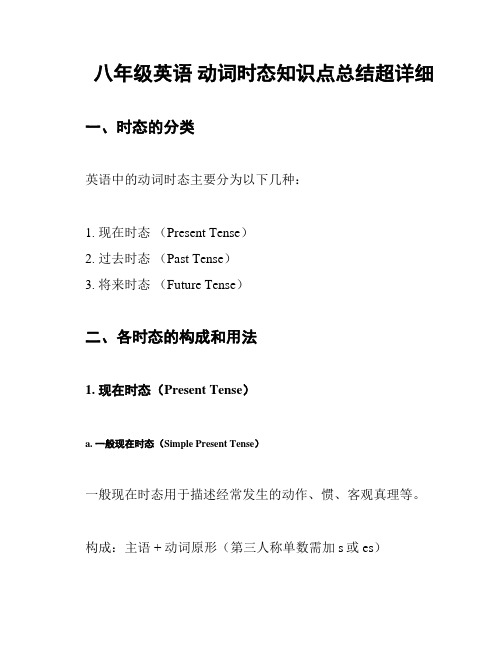
八年级英语动词时态知识点总结超详细一、时态的分类英语中的动词时态主要分为以下几种:1. 现在时态(Present Tense)2. 过去时态(Past Tense)3. 将来时态(Future Tense)二、各时态的构成和用法1. 现在时态(Present Tense)a. 一般现在时态(Simple Present Tense)一般现在时态用于描述经常发生的动作、惯、客观真理等。
构成:主语 + 动词原形(第三人称单数需加s或es)例句:- I play basketball every day.(我每天都打篮球。
)- He eats an apple for breakfast.(他早餐吃一个苹果。
)b. 现在进行时态(Present Continuous Tense)现在进行时态用于描述正在进行的动作或现阶段的临时情况。
构成:主语 + be动词(am/is/are)+ 现在分词例句:- We are studying English now.(我们现在正在学英语。
)- She is reading a book at the moment.(她此刻正在读一本书。
)c. 现在完成时态(Present Perfect Tense)现在完成时态用于描述过去发生的动作对现在产生的影响或结果。
构成:主语 + have/has + 过去分词例句:- I have finished my homework.(我已经完成了我的作业。
)- They have visited China many times.(他们已经多次访问过中国。
)2. 过去时态(Past Tense)a. 一般过去时态(Simple Past Tense)一般过去时态用于描述过去某个特定时间发生的动作或状态。
构成:主语 + 动词过去式例句:- She danced at the party last night.(她昨晚在派对上跳舞了。
初中易考知识点常见动词的时态与语态变化
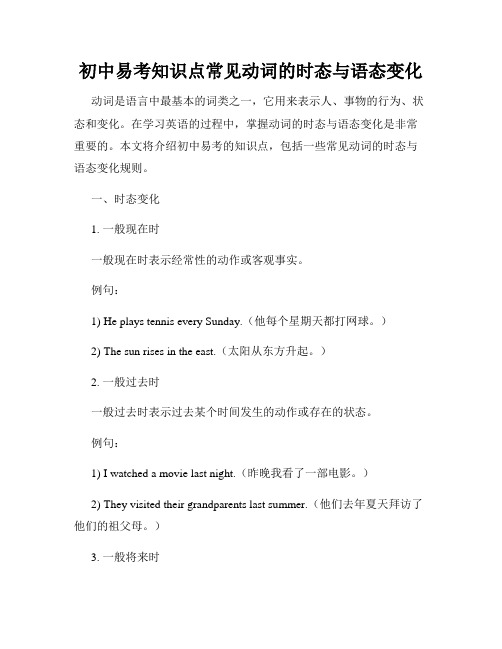
初中易考知识点常见动词的时态与语态变化动词是语言中最基本的词类之一,它用来表示人、事物的行为、状态和变化。
在学习英语的过程中,掌握动词的时态与语态变化是非常重要的。
本文将介绍初中易考的知识点,包括一些常见动词的时态与语态变化规则。
一、时态变化1. 一般现在时一般现在时表示经常性的动作或客观事实。
例句:1) He plays tennis every Sunday.(他每个星期天都打网球。
)2) The sun rises in the east.(太阳从东方升起。
)2. 一般过去时一般过去时表示过去某个时间发生的动作或存在的状态。
例句:1) I watched a movie last night.(昨晚我看了一部电影。
)2) They visited their grandparents last summer.(他们去年夏天拜访了他们的祖父母。
)3. 一般将来时一般将来时表示将来某个时间会发生的动作或存在的状态。
例句:1) We will have a party next week.(下周我们将举行一次聚会。
)2) She is going to visit her friend tomorrow.(她打算明天去看望她的朋友。
)4. 现在进行时现在进行时表示现在正在进行的动作。
例句:1) He is reading a book now.(他现在正在读一本书。
)2) They are playing football in the park.(他们正在公园里踢足球。
)5. 过去进行时过去进行时表示过去某个时间正在进行的动作。
例句:1) She was studying when I called her.(我给她打电话时,她正在学习。
)2) They were walking in the rain yesterday.(昨天他们在雨中走路。
)6. 现在完成时现在完成时表示过去发生的动作对现在造成的影响或结果。
初中英语易错时态归纳总结

初中英语易错时态归纳总结英语时态是初中阶段学习英语的难点之一,很多学生在使用时态上容易犯错。
正确运用时态不仅可以提高语言表达的准确性,还可以帮助我们更好地理解和使用英语。
本文将对初中英语中易错的时态进行归纳总结,帮助大家更好地掌握时态的用法。
一、一般现在时一般现在时表示经常性或习惯性的动作、状态或真理。
例如:1. He usually goes to school by bus.(他通常坐公交车去学校。
)2. The earth revolves around the sun.(地球绕着太阳转。
)3. They often play basketball after school.(他们放学后经常打篮球。
)二、一般过去时一般过去时表示过去某个时间发生的动作或状态。
例如:1. I watched a movie last night.(昨晚我看了一部电影。
)2. She lived in Beijing when she was young.(她年轻时住在北京。
)3. We visited the museum on Sunday.(星期天我们参观了博物馆。
)三、一般将来时一般将来时表示将来某个时间要发生的动作或状态。
例如:1. I will go to the park tomorrow.(明天我将去公园。
)2. They are going to have a party next week.(他们下周要举办一个聚会。
)3. She is going to study abroad after graduation.(她毕业后要去国外留学。
)四、现在进行时现在进行时表示现在正在进行的动作。
例如:1. He is studying English now.(他现在正在学英语。
)2. They are playing football in the park.(他们正在公园踢足球。
)3. We are having dinner at the restaurant.(我们正在餐馆吃饭。
初中英语知识归纳总结——动词的时态

初中英语知识归纳总结——动词的时态动词的时态(一)教学重点一般现在时在英语中,不同时间里以不同方式发生的动作或存在的状态,要用不同的动词形式来表示,动词的这种不同形式称为动词的时态。
时态从时间上划分,可分为四大类:现在时;过去时;将来时;过去将来时。
从行为上,每一类可以分为四种形式:一般式;进行式;完成式;完成进行式。
这样英语的动词合起来,总共有十六种时态,初中只需掌握其中的八种时态。
1、一般现在时(1)一般现在时表示现在的状态、习惯性的动作或主语所具备的性格和能力等。
①当动词是be时,第一人称用am,第二人称用is,其他人称用are.②当动词是实义动词时,一般用动词原形,但如果主语是第三人称单数时,动词必须用第三人称单数形式,其变化规则如下:助动词do(第三人称单数用does)构成否定句、疑问句及答语,但要注意助动词后原来的谓语动词要恢复原形。
例如:I like music.I don’t like music.Do you like music?Yes, I do No, I don’t(2)一般现在时的用法①表示经常、习惯性动作,常和often, usually, every day, sometimes, always 等时间状语连用。
如:He goes to school by bus every day.They often play football②表示能力、职业、特征。
如:Miss Gao teaches English.Do you speak Japanese?③表示客观存在。
如:The earth moves round the sun.Time and tide wait for no man.④表示已经安排好或计划好的事。
如The plane takes off at 7:30.Classes begin at 8:00⑤在时间状语和条件状语从句中,主句用一般将来时,从句用一般现在时。
初中英语知识点归纳动词的不同时态与语态

初中英语知识点归纳动词的不同时态与语态动词的不同时态与语态是初中英语的重要知识点。
掌握了动词的时态和语态,我们就能更准确地表达过去、现在和将来的动作,以及主语对动作的不同态度。
下面是对初中英语中动词的不同时态与语态的归纳总结。
一、动词的时态1. 一般现在时一般现在时表示经常性或习惯性的动作、客观真理、固定事件等。
例句:- I go to school every day.(我每天去上学。
)- The sun rises in the east.(太阳从东方升起。
)2. 现在进行时现在进行时表示现在正在进行的动作。
例句:- He is watching TV now.(他正在看电视。
)- They are playing basketball in the park.(他们正在公园里打篮球。
)3. 一般过去时一般过去时表示过去发生的动作或存在的状态。
例句:- We watched a movie last night.(昨晚我们看了一场电影。
)- She lived in Beijing when she was young.(她年轻时住在北京。
)4. 过去进行时过去进行时表示过去某个时间正在进行的动作。
例句:- They were having dinner at 7 o'clock yesterday.(昨天7点他们正在吃晚饭。
)- At this time last year, I was studying in London.(去年这个时间,我正在伦敦学习。
)5. 将来时将来时表示将要发生的动作或存在的状态。
例句:- We will go to the beach next week.(下周我们将去海滩。
)- She is going to visit her grandparents tomorrow.(她明天将要去看望她的祖父母。
)二、动词的语态1. 主动语态主动语态表示主语是动作的执行者。
八大时态用法及详解
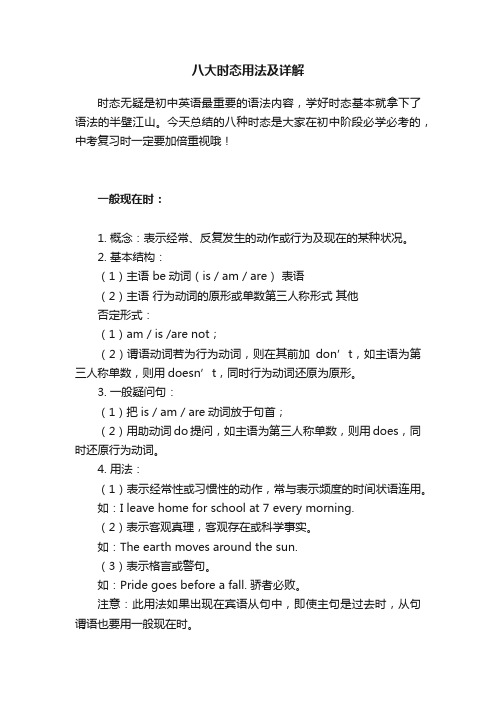
八大时态用法及详解时态无疑是初中英语最重要的语法内容,学好时态基本就拿下了语法的半壁江山。
今天总结的八种时态是大家在初中阶段必学必考的,中考复习时一定要加倍重视哦!一般现在时:1. 概念:表示经常、反复发生的动作或行为及现在的某种状况。
2. 基本结构:(1)主语 be动词(is / am / are)表语(2)主语行为动词的原形或单数第三人称形式其他否定形式:(1)am / is /are not;(2)谓语动词若为行为动词,则在其前加don’t,如主语为第三人称单数,则用doesn’t,同时行为动词还原为原形。
3. 一般疑问句:(1)把is / am / are动词放于句首;(2)用助动词do提问,如主语为第三人称单数,则用does,同时还原行为动词。
4. 用法:(1)表示经常性或习惯性的动作,常与表示频度的时间状语连用。
如:I leave home for school at 7 every morning.(2)表示客观真理,客观存在或科学事实。
如:The earth moves around the sun.(3)表示格言或警句。
如:Pride goes before a fall. 骄者必败。
注意:此用法如果出现在宾语从句中,即使主句是过去时,从句谓语也要用一般现在时。
如:Columbus proved that the earth is round.(4)表示现在时刻的状态、能力、性格、个性等。
如:I don’t want so much.Ann writes good English but does not speak well.(5)一般现在时表示将来含义① come, go, arrive, leave, start, begin, return的一般现在时可以表示将来,主要用来表示在时间上已确定或安排好的事情。
如:The train leaves at six tomorrow morning.— When does the bus star?— It stars in ten minutes.② 在时间或条件状语句中。
初中英语时态归纳总结
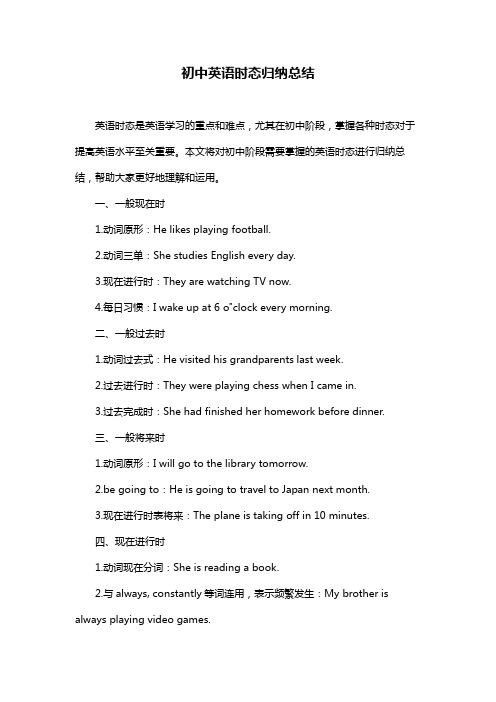
初中英语时态归纳总结英语时态是英语学习的重点和难点,尤其在初中阶段,掌握各种时态对于提高英语水平至关重要。
本文将对初中阶段需要掌握的英语时态进行归纳总结,帮助大家更好地理解和运用。
一、一般现在时1.动词原形:He likes playing football.2.动词三单:She studies English every day.3.现在进行时:They are watching TV now.4.每日习惯:I wake up at 6 o"clock every morning.二、一般过去时1.动词过去式:He visited his grandparents last week.2.过去进行时:They were playing chess when I came in.3.过去完成时:She had finished her homework before dinner.三、一般将来时1.动词原形:I will go to the library tomorrow.2.be going to:He is going to travel to Japan next month.3.现在进行时表将来:The plane is taking off in 10 minutes.四、现在进行时1.动词现在分词:She is reading a book.2.与always, constantly等词连用,表示频繁发生:My brother is always playing video games.五、过去进行时1.动词过去分词:They were discussing the project.2.与at that time, at this moment等词连用,表示在某个时间正在进行的动作:At that time, she was sleeping.六、完成时1.现在完成时:I have finished my homework.2.过去完成时:He had left the classroom before I arrived.七、被动语态1.一般现在时:The book is written by him.2.一般过去时:The window was broken by Tom.3.一般将来时:The letter will be sent to her tomorrow.总结:初中英语时态的学习需要掌握一般现在时、一般过去时、一般将来时、现在进行时、过去进行时、完成时和被动语态等。
中考语法知识点归纳动词时态语态与非谓语动词
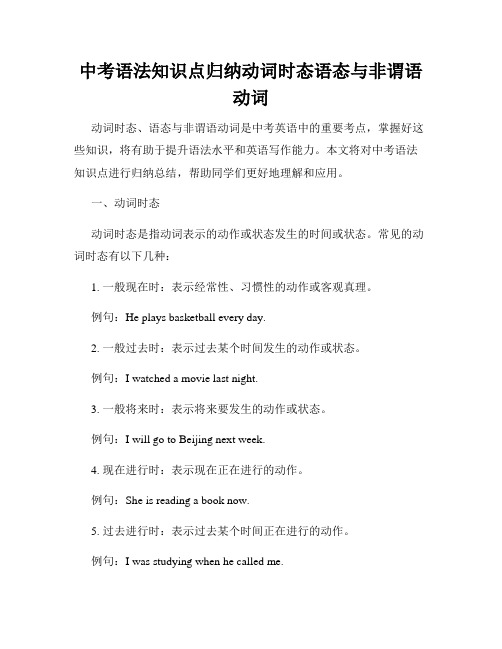
中考语法知识点归纳动词时态语态与非谓语动词动词时态、语态与非谓语动词是中考英语中的重要考点,掌握好这些知识,将有助于提升语法水平和英语写作能力。
本文将对中考语法知识点进行归纳总结,帮助同学们更好地理解和应用。
一、动词时态动词时态是指动词表示的动作或状态发生的时间或状态。
常见的动词时态有以下几种:1. 一般现在时:表示经常性、习惯性的动作或客观真理。
例句:He plays basketball every day.2. 一般过去时:表示过去某个时间发生的动作或状态。
例句:I watched a movie last night.3. 一般将来时:表示将来要发生的动作或状态。
例句:I will go to Beijing next week.4. 现在进行时:表示现在正在进行的动作。
例句:She is reading a book now.5. 过去进行时:表示过去某个时间正在进行的动作。
例句:I was studying when he called me.6. 现在完成时:表示过去的动作对现在造成的影响或结果。
例句:She has visited Paris three times.7. 过去完成时:表示对过去某个时间之前发生的动作进行的描述。
例句:They had already left when I arrived.二、动词语态动词语态是指动作发出的主体和动作所受的影响关系。
英语中常见的动词语态有以下几种:1. 主动语态:表示主语是动作的发出者。
例句:He fixed the car yesterday.2. 被动语态:表示主语是动作的承受者。
例句:The car was fixed by him yesterday.3. 进行时态:表示主语正在进行的动作处于进行状态。
例句:The book is being read by her.4. 完成时态:表示主语已经完成的动作处于完成状态。
例句:The book has been read by her.注意:被动语态需要根据动作的时态来变换,同时需要适当更改时态动词。
初中中的动词时态考点解析及解题技巧

初中中的动词时态考点解析及解题技巧动词时态在中学英语学习中是一个重要的考点,正确使用时态不仅可以提高语言表达的准确性,还能使语句更加通顺和流畅。
本文将对初中学生常见的动词时态进行解析,并提供一些解题技巧,帮助学生更好地应对相关考试。
一、一般现在时一般现在时表示经常性、习惯性的动作或存在的状态。
主要的时间状语有always、usually、often 等,常和频率副词连用。
1. 解析题目答案技巧:- 通过关键词判断时态,如always、usually、often 等- 主语为第三人称单数时,动词加-s/-es- 如无时间状语,使用一般现在时。
- 一般疑问句: 将助动词do/does放在句首- 特殊疑问句: 特殊疑问词 + 一般疑问句结构例题:- She (go) to school every day.解析:根据关键词every day 可以判断使用一般现在时。
主语为第三人称单数,所以动词应该变为goes。
答案为goes。
二、一般过去时一般过去时表示过去某个时间发生的动作或状态。
主要的时间状语有yesterday、last week/month/year等。
2. 解析题目答案技巧:- 通过关键词判断时态,如yesterday、last week/month/year等- 一般疑问句: 将助动词did放在句首,动词还原形。
- 特殊疑问句: 特殊疑问词 + 一般疑问句结构例题: - He (play) basketball with his friends yesterday.解析:根据关键词yesterday可判断使用一般过去时。
play的过去式是played。
答案为played。
三、一般将来时一般将来时表示将来某个时间要发生的动作或存在的状态。
主要的时间状语有tomorrow、next week/month/year等。
3. 解析题目答案技巧:- 通过关键词判断时态,如tomorrow、next week/month/year等- 一般疑问句: 将助动词will放在句首- 特殊疑问句: 特殊疑问词 + 一般疑问句结构例题: - We (visit) our grandparents next week.解析:根据关键词next week可判断使用一般将来时。
(全面解读)初中英语动词时态和语态说明
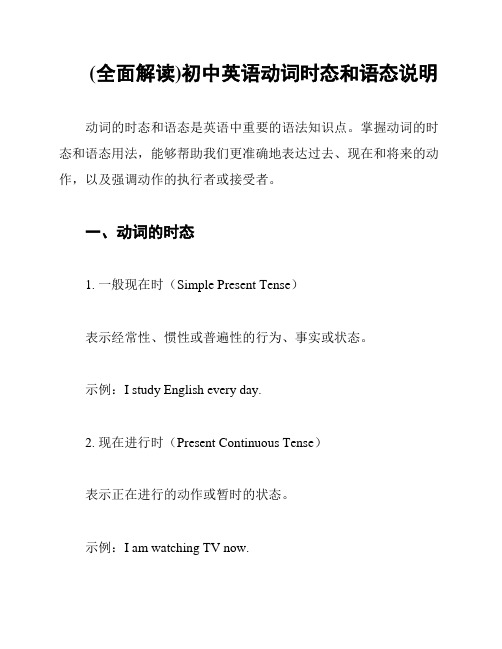
(全面解读)初中英语动词时态和语态说明动词的时态和语态是英语中重要的语法知识点。
掌握动词的时态和语态用法,能够帮助我们更准确地表达过去、现在和将来的动作,以及强调动作的执行者或接受者。
一、动词的时态1. 一般现在时(Simple Present Tense)表示经常性、惯性或普遍性的行为、事实或状态。
示例:I study English every day.2. 现在进行时(Present Continuous Tense)表示正在进行的动作或暂时的状态。
示例:I am watching TV now.3. 一般过去时(Simple Past Tense)表示过去发生的动作或存在的状态。
示例:She played basketball yesterday.4. 过去进行时(Past Continuous Tense)表示过去某个时间段内正在进行的动作。
示例:They were studying English last night.5. 现在完成时(Present Perfect Tense)表示过去某个时间内发生的动作对现在的影响或结果。
示例:He has finished his homework.6. 过去完成时(Past Perfect Tense)表示过去某个时间点或动作之前已经完成的动作。
示例:She had already left when I arrived.7. 将来时(Future Tense)表示将要发生的动作或存在的状态。
示例:We will go to the beach next week.二、动词的语态1. 被动语态(Passive Voice)动作的执行者是不确定的、不重要的,强调动作的承受者。
示例:The cake was eaten by him.2. 主动语态(Active Voice)动作的执行者是明确的、重要的。
示例:She wrote a letter.以上是初中英语动词时态和语态的简单说明。
常见英语动词的时态最全总结含答案解析推荐精选
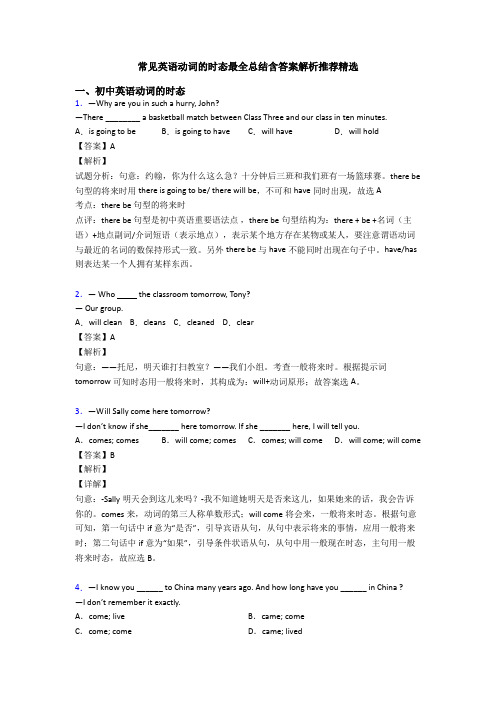
常见英语动词的时态最全总结含答案解析推荐精选一、初中英语动词的时态1.―Why are you in such a hurry, John?―There ________ a basketball match between Class Three and our class in ten minutes.A.is going to be B.is going to have C.will have D.will hold【答案】A【解析】试题分析:句意:约翰,你为什么这么急?十分钟后三班和我们班有一场篮球赛。
there be 句型的将来时用there is going to be/ there will be,不可和have同时出现,故选A考点:there be 句型的将来时点评:there be 句型是初中英语重要语法点,there be句型结构为:there + be +名词(主语)+地点副词/介词短语(表示地点),表示某个地方存在某物或某人,要注意谓语动词与最近的名词的数保持形式一致。
另外there be 与have不能同时出现在句子中。
have/has 则表达某一个人拥有某样东西。
2.— Who the classroom tomorrow, Tony?— Our group.A.will clean B.cleans C.cleaned D.clear【答案】A【解析】句意:——托尼,明天谁打扫教室?——我们小组。
考查一般将来时。
根据提示词tomorrow可知时态用一般将来时,其构成为:will+动词原形;故答案选A。
3.—Will Sally come here tomorrow?—I don’t know if she_______ here tomorrow. If she _______ here, I will tell you.A.comes; comes B.will come; comes C.comes; will come D.will come; will come 【答案】B【解析】【详解】句意:-Sally明天会到这儿来吗?-我不知道她明天是否来这儿,如果她来的话,我会告诉你的。
初中英语易混淆知识点总结

初中英语易混淆知识点总结一、时态的混淆1. 一般现在时与现在进行时:一般现在时表示习惯性动作或普遍真理,而现在进行时则表示正在进行的动作。
例如,She always helpsothers(她总是帮助别人)与She is helping others now(她现在正在帮助别人)。
2. 一般过去时与过去进行时:一般过去时表示过去某一确定时间发生的动作,而过去进行时则强调过去某一时刻正在进行的动作。
例如,He walked to school yesterday(他昨天走路去学校)与He was walking to school this time yesterday(昨天这个时候他正在走路去学校)。
3. 现在完成时与现在完成进行时:现在完成时表示过去发生的动作对现在有影响,现在完成进行时则强调从过去某一时间开始一直持续到现在的动作。
例如,I have finished my homework(我已经完成了我的作业)与I have been working on my homework(我一直在做我的作业)。
二、介词的使用1. in, on, at:in用于表示在某个范围或区域内部,on表示在表面上,at表示某个点。
例如,在桌子上(on the table)、在公园里(in the park)、在五点钟(at 5 o'clock)。
2. to, for:to表示方向,目的地,for表示目的,受益方。
例如,I am going to the library(我要去图书馆)与I am buying a bookfor you(我为你买本书)。
三、冠词的误用1. the, a, an:定冠词the用于特指某个已知的人或物,不定冠词a/an用于泛指。
例如,The sun rises in the east(太阳从东方升起)是固定搭配,而A cat is a lovely pet(猫是一种可爱的宠物)则泛指任何一只猫。
初中英语必考八大时态结构及用法详解
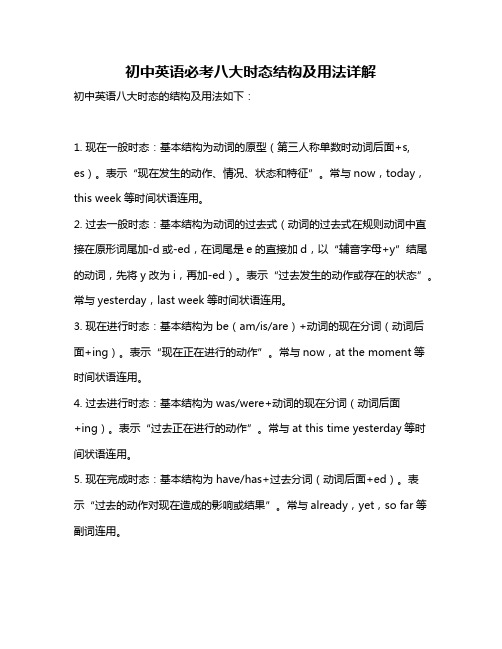
初中英语必考八大时态结构及用法详解初中英语八大时态的结构及用法如下:1. 现在一般时态:基本结构为动词的原型(第三人称单数时动词后面+s, es)。
表示“现在发生的动作、情况、状态和特征”。
常与now,today,this week等时间状语连用。
2. 过去一般时态:基本结构为动词的过去式(动词的过去式在规则动词中直接在原形词尾加-d或-ed,在词尾是e的直接加d,以“辅音字母+y”结尾的动词,先将y改为i,再加-ed)。
表示“过去发生的动作或存在的状态”。
常与yesterday,last week等时间状语连用。
3. 现在进行时态:基本结构为be(am/is/are)+动词的现在分词(动词后面+ing)。
表示“现在正在进行的动作”。
常与now,at the moment等时间状语连用。
4. 过去进行时态:基本结构为was/were+动词的现在分词(动词后面+ing)。
表示“过去正在进行的动作”。
常与at this time yesterday等时间状语连用。
5. 现在完成时态:基本结构为have/has+过去分词(动词后面+ed)。
表示“过去的动作对现在造成的影响或结果”。
常与already,yet,so far等副词连用。
6. 过去完成时态:基本结构为had+过去分词(动词后面+ed)。
表示“过去的动作在过去的某个时间之前已经完成或发生的动作或存在的状态”。
常与by the end of last year,by the time of等时间状语连用。
7. 现在完成进行时态:基本结构为have/has been+动词的现在分词(动词后面+ing)。
表示“动作从过去某时开始,一直延续到现在,或者刚刚完成”。
常与for several days,since等时间状语连用。
8. 过去完成进行时态:基本结构为had been+动词的现在分词(动词后面+ing)。
表示“过去的某个动作从过去某时开始,一直延续到过去的某个时间,或者刚刚完成”。
初中英语知识归纳动词的三种时态
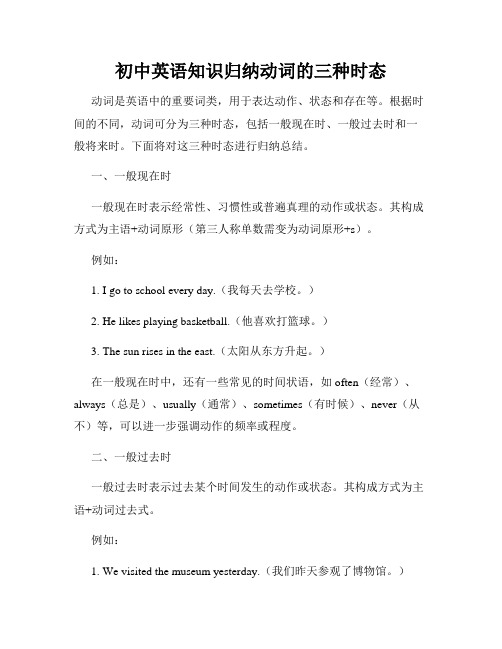
初中英语知识归纳动词的三种时态动词是英语中的重要词类,用于表达动作、状态和存在等。
根据时间的不同,动词可分为三种时态,包括一般现在时、一般过去时和一般将来时。
下面将对这三种时态进行归纳总结。
一、一般现在时一般现在时表示经常性、习惯性或普遍真理的动作或状态。
其构成方式为主语+动词原形(第三人称单数需变为动词原形+s)。
例如:1. I go to school every day.(我每天去学校。
)2. He likes playing basketball.(他喜欢打篮球。
)3. The sun rises in the east.(太阳从东方升起。
)在一般现在时中,还有一些常见的时间状语,如often(经常)、always(总是)、usually(通常)、sometimes(有时候)、never(从不)等,可以进一步强调动作的频率或程度。
二、一般过去时一般过去时表示过去某个时间发生的动作或状态。
其构成方式为主语+动词过去式。
例如:1. We visited the museum yesterday.(我们昨天参观了博物馆。
)2. She studied English last night.(她昨晚学习了英语。
)3. They went to the park two days ago.(他们两天前去了公园。
)一般过去时中也有常见的时间状语,如yesterday(昨天)、last week(上周)、in 1990(在1990年)等,用于明确表示动作发生的具体时间或时间范围。
三、一般将来时一般将来时表示将要发生的动作或存在的状态。
其构成方式为主语+will+动词原形。
例如:1. I will visit my grandparents tomorrow.(我明天将去看望我的祖父母。
)2. She will study abroad next year.(她明年将出国留学。
)3. We will have a party on Friday.(我们将在星期五举行聚会。
初中重要知识点归纳动词时态与语态的用法总结
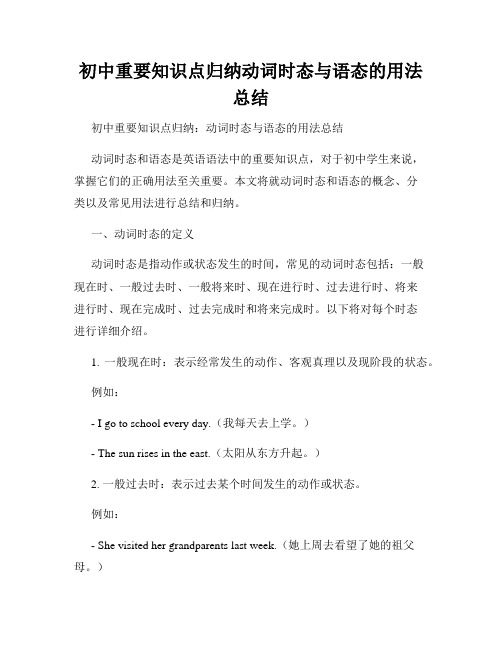
初中重要知识点归纳动词时态与语态的用法总结初中重要知识点归纳:动词时态与语态的用法总结动词时态和语态是英语语法中的重要知识点,对于初中学生来说,掌握它们的正确用法至关重要。
本文将就动词时态和语态的概念、分类以及常见用法进行总结和归纳。
一、动词时态的定义动词时态是指动作或状态发生的时间,常见的动词时态包括:一般现在时、一般过去时、一般将来时、现在进行时、过去进行时、将来进行时、现在完成时、过去完成时和将来完成时。
以下将对每个时态进行详细介绍。
1. 一般现在时:表示经常发生的动作、客观真理以及现阶段的状态。
例如:- I go to school every day.(我每天去上学。
)- The sun rises in the east.(太阳从东方升起。
)2. 一般过去时:表示过去某个时间发生的动作或状态。
例如:- She visited her grandparents last week.(她上周去看望了她的祖父母。
)- They lived in that house for five years.(他们在那个房子里住了五年。
)3. 一般将来时:表示将来某个时间将要发生的动作或状态。
例如:- We will have a party next weekend.(我们下个周末将要举办一次派对。
)- He is leaving for London tomorrow.(他明天将离开去伦敦。
)4. 现在进行时:表示现在正在进行的动作。
例如:- I am reading a book.(我正在读一本书。
)- They are playing basketball in the park.(他们正在公园里打篮球。
)5. 过去进行时:表示过去某个时间正在进行的动作。
例如:- She was studying when I called her.(我给她打电话的时候,她正在学习。
)- We were watching a movie at that time.(那个时候我们正在看电影。
初中英语动词时态总结

初中英语动词时态总结初中英语动词时态总结动词时态是表示动作发生的时间的形式。
在英语中,动词时态分为四种基本时态:一般现在时、一般过去时、一般将来时和现在进行时。
此外,还有一些复合时态,如现在完成时、过去完成时和将来完成时等。
以下是对这些时态的详细总结。
一、一般现在时一般现在时表示经常性或习惯性的动作、客观真理、现实状态或普遍现象。
一般现在时的结构是主语+动词的原形(第三人称单数要加-s)。
1. 经常性或习惯性的动作:She often goes to the park on weekends.2. 客观真理:The earth revolves around the sun.3. 现实状态:I feel tired today.4. 普遍现象:People like to eat chocolate.二、一般过去时一般过去时表示在过去某个时间发生的动作或存在的状态。
一般过去时的结构是主语+动词的过去式。
1. 过去某个时间的动作:They went to the beach last summer.2. 过去存在的状态:She was a teacher before retirement.三、一般将来时一般将来时表示将要发生的动作或存在的状态。
一般将来时的结构是主语+will/won't+动词的原形。
1. 将要发生的动作:I will finish my homework tonight.2. 将要存在的状态:He will be a doctor in the future.四、现在进行时现在进行时表示正在进行的动作。
现在进行时的结构是主语+am/is/are+动词的ing形式。
1. 正在进行的动作:She is reading a book now.2. 临时状态:I am staying with my friends this week.五、现在完成时现在完成时表示过去发生的动作对现在造成的影响或结果。
初中易考知识点常见动词时态

初中易考知识点常见动词时态动词时态是语法中的一个重要部分,掌握好动词时态的用法对于初中学生来说非常重要。
本文将介绍常见的动词时态,帮助读者更好地理解和运用。
一、一般现在时一般现在时是最常见的时态之一,表示经常性或普遍性的动作、状态或习惯。
例如:1. I go to school every day.(我每天去学校。
)2. She likes playing basketball.(她喜欢打篮球。
)二、一般过去时一般过去时用于表示过去某个时间发生过的动作或状态。
例如:1. He went to France last year.(他去年去了法国。
)2. They played video games yesterday.(他们昨天打电子游戏。
)三、一般将来时一般将来时用于表示将来某个时间会发生的动作或状态。
例如:1. We will have a party tomorrow.(我们明天将举办一个派对。
)2. She is going to visit her grandparents next week.(她下周打算去看望她的爷爷奶奶。
)四、现在进行时现在进行时用于表示现在正在进行的动作。
例如:1. They are eating dinner right now.(他们正在吃晚饭。
)2. I am studying for the test.(我正在为考试而学习。
)五、过去进行时过去进行时用于表示过去某个时间正在进行的动作。
例如:1. We were watching a movie at that time.(那时我们正在看电影。
)2. He was playing football with his friends yesterday.(昨天他正在和朋友们踢足球。
)六、将来进行时将来进行时用于表示将来某个时间正在进行的动作。
例如:1. this time next month, she will be taking an exam.(下个月这个时候,她将正在参加考试。
初二常用动词时态总结与运用

初二常用动词时态总结与运用动词是语言中最基本的构成部分之一,它用来描述动作、状态或存在。
在学习英语的初二阶段,我们掌握了一些常用的动词时态,它们对于我们正确使用英语具有重要的作用。
本文将总结初二阶段常用的动词时态,并给出一些运用的例子。
一、一般现在时(Simple Present Tense)一般现在时是用来表示经常性、习惯性的动作或状态。
一般现在时的动词形式与主语一致,只需在第三人称单数(he,she,it)加上-s或-es。
例句:1. I go to school by bus every day.2. She always brushes her teeth before going to bed.二、一般过去时(Simple Past Tense)一般过去时是用来表示过去某个时间点或一段时间内发生的动作或状态。
一般过去时的动词形式大多数以-ed结尾,也有一些不规则动词需要特别记忆。
例句:1. He watched a movie last night.2. We lived in London for five years.三、一般将来时(Simple Future Tense)一般将来时是用来表示将来某个时间会发生的动作或状态。
一般将来时常与表示将来的时间状语连用,如tomorrow,next week等。
例句:1. They will visit their grandparents this weekend.2. I am going to have a picnic with my friends tomorrow.四、现在进行时(Present Continuous Tense)现在进行时表示现在正在进行的动作或状态,动词be的形式与主语以及进行动作的动词进行搭配,动词进行时所带的-ing结尾。
例句:1. She is studying in the library now.2. They are playing soccer in the park.五、过去进行时(Past Continuous Tense)过去进行时表示过去某个时间点或一段时间内正在进行的动作或状态,也常与表示过去的时间状语连用。
- 1、下载文档前请自行甄别文档内容的完整性,平台不提供额外的编辑、内容补充、找答案等附加服务。
- 2、"仅部分预览"的文档,不可在线预览部分如存在完整性等问题,可反馈申请退款(可完整预览的文档不适用该条件!)。
- 3、如文档侵犯您的权益,请联系客服反馈,我们会尽快为您处理(人工客服工作时间:9:00-18:30)。
1.Sales of CDs have greatly increased since the early 1990s, when people ________ to enjoy the advantages of this new technology.A.beginB. beganC.have begunD. had begun2.Turn on the television or open a magazine and you ________ advertisements showing happy families.A.will often seeB. often seeC.are often seeingD. have often seen3.—I hear Jane has gone to the Holy Island for her holiday.—Oh, how nice! Do you know when she ________?A.was leavingB. had leftC.has leftD. left4.—What were you doing when Tony phoned you?—I had just finished my work and________ to take a shower.A.had startedB. startedC.have startedD. was starting5.I ________ you not to move my dictionary—now I can’t find it.A.askedB. askC.was askingD. had asked6.—Has Sam finished his homework today?—I have no idea. He ________ it this morning.A.didB. has doneC.was doingD. had done7.—What’s that terrible noise?—The neighbors ________ for a party.A.have preparedB. are preparingC.prepareD. will prepare8.Now that she is out of a job, Lucy ________ going back to school, but she hasn’t decided yet.A.had consideredB. has been consideringC.consideredD. is going to consider9.The teacher, with 6 girls and 8 boys of her class, ________ visiting a museum when the earthquake struck.A.wasB. wereC.had beenD. would be10.The discussion ________ alive when an interesting topic was brought in.A.was comingB. had comeC.has comeD. came11.Because the shop ________ , all the T-shirts are sold at half price.A.has closed downB. closed downC.is closing downD. had closed down12.Let’s keep to the point or we ________ any decisions.A.will never reachB. have never reachedC.never reachD. never reached13.My mind wasn’t on what he was saying so I’m afraid I ________ half of it.A.was missingB. had missedC.will missD. missed14.It is said in the book that Thomas Edison (1847—1931) ________ the world-leading inventor for sixty years.A.would beB. has beenC.had beenD. was15.—You were out when I dropped in at your house.—Oh, I ________ for a friend from England at the airport.A.was waitingB. had waitedC.am waitingD. has waited16.She has set a new record, that is, the sales of her latest book ________ 50 million.A.have reachedB. has reachedC.are reachingD. had reached17.He kept looking at her, wondering whether he ________ her somewhere.A.sawB. has seenC.seesD. had seen18.The crazy fans ________ patiently for two hours and they would wait till the movie stararrived.A.were waitingB. had been waitingC.had waitedD. would wait19.She ________ her hairstyle in her hometown before she came to Chongqing for a better job.A.would changeB. has changedC.changedD. was changing20.The first use of atomic weapons was in 1945, and their power ________ increased enormously ever since.A.isB. wasC.has beenD. had been21.—You haven’t said a word about my new coat, Brenda. Do you like it?—I’m sorry I ________ anything about it sooner. I certainly think it’s pretty on you.A.wasn’t sayingB. don’t sayC.won’t sayD. didn’t say22.All morning as she waited for the medical report from the doctor, her nervousness ________.A.has grownB. is growingC.grewD. had grown23.Why don’t you put the meat in the fridge? It will ________ fresh for several days.A.be stayedB.stayC.be stayingD. have stayed24.How can you possibly miss the news? It ________ on TV all day long.A.has beenB. had beenC.wasD. will be25.-Sorry to have interrupted you. Please go on.-Where was I?-You ________ you didn’t like your father’s job.A.had saidB. saidC.were sayingD. had been saying26.I arrived late; I ________ the road to be so icy.A.wouldn’t expectB. haven’t expectedC.hadn’t expectedD. wasn’t expecting27.I ________ while reading the English textbook. Luckily, my roommate woke me up in time!A.had fallen asleepB. have fallen asleepC.fell asleepD. fall asleep28.Although he has lived with us for years, he _______ us much impression.A.hadn’t leftB. didn’t leaveC.doesn’t leaveD. hasn’t left29.I ________ ping-pong quite well, but I haven’t had time to play since the new year.A.will playB. have playedC.playedD. play30.I wonder why Jenny ________ us recently. We should have heard from her by now.A.hasn’t writtenB. doesn’t writeC.won’t writeD. hadn’t written31. A short time before she ________ , the old lady ________ a will, leaving all her money to her brother.A.died; has writtenB. has died; wroteC.had died; wroteD. died; had written(from )32.— Kate doesn’t look very well. What’s wrong with her?— She has a headache because she ________ too long; she ought to stop work.A.has been readingB. had readC.is readingD. was reading33.As time ________ on, Sally began to wonder if Bruce ________ Bilks’new poem called Tabled’Hute.A.has gone; had readB. went; has readC.goes; has readD. went; had read34.—Mike, do you know who wanted me on the phone?—Sorry. I don’t know. I ________ a bath in the bathroom.A.have hadB. was havingC.hadD. am having35.—Could you tell me how your father usually goes to work?—Yes. If it is fine, he ________ to his office.A.will walkB. will go on footC.walksD. would go on foot36.— I called you at ten, but there was no reply.—Oh, that was probably when I ________ a shower.A.am takingB. tookC.were to takeD. was taking37.— Have you ever worked with a tape recorder?— I ________ it a lot when I was studying French in school.edB. was usedC.have usedD. had used38.—You must have met him the other day. —Oh, no, I ________ .A.hadn’tB. mustn’tC.haven’tD. didn’t39.—Which flight ________ ? —I want to catch the 13:00.A.you are to catchB. are you catchingC.do you catchD. have you caught40.—Excuse me, sir. Would you do me a favor?—Of course. What is it?—I ________ if you could tell me how to fill out this form.A.had wonderedB. was wonderingC.would wonderD. did wonder41.How can I ever concentrate (集中精力) if you ________ continually ________ me with silly questions?A.have…interruptedB. had interruptedC.are…interruptingD. were…interrupting42.—I bought this shirt for 35 yuan yesterday.—It’s on sale today for only 29. You should have waited.—Oh, really? But how ________ I know?A.wouldB. canC.didD. do43.—Will you go now? (from )—Not until I ________ my experiments.A.will finishB. have finishedC.will have finishedD. had finished44.—Look! Someone has spilt coffee on the carpet.—Well, it ________ me.A.isn’tB. hasn’t beenC.hadn’t beenD. wasn’t45.—Did you enjoy your holiday?—Yes, it’s the best holiday I ________ these years.A.hadB. have hadC.had hadD. would have46.I don’t understand how you got a ticket. I always ________ you ________ a careful driver.A.think; areB. am thinking; areC.thought; wereD. think; were47.I really ought to go on a diet。
